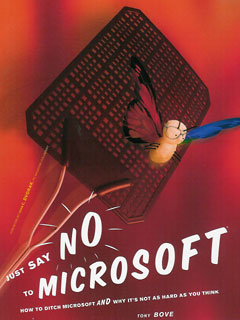As Mac
users, we've already made a choice to say "no" to the majority
computing platform, so many of us may be interested in Tony Bove's
Just Say No to Microsoft (No Starch Press, US$24.95) with
its subtitle, "How to ditch Microsoft and why it's not as hard as
you think".
Bove focuses on how to replace Microsoft Windows with Macs and
Linux operating systems - and how users who remain Windows-users
can make their systems as Microsoft-free as possible with
alternatives to Internet Explorer, Microsoft Office, Windows Media
Player, and more.
He offers a history of Microsoft as it rose to dominate the
field of personal computer operating systems and productivity
software, chapters on Mac and Linux, and looks at alternatives to
the various Microsoft Office programs and Windows Media Player.
That's followed by network and Internet alternatives and a 12-step
program for kicking the Microsoft addiction.
 The book is an often-sprightly read with a
combination of humour, anger, and practical tips.
The book is an often-sprightly read with a
combination of humour, anger, and practical tips.
It Doesn't Quite Work
But for me, it doesn't quite work. Bove seems trapped by his
anti-Microsoft frame. As a result, complicated procedures in
Windows or Microsoft software are always pointed out negatively,
while often-complicated procedures in Microsoft alternatives are
simply ignored.
This starts on the first page of the introduction, where Bove
notes his elation at running OpenOffice.org's office software on
his PowerBook. "Not a piece of Microsoft code in sight." True, but
also no mention of the effort it takes to get the non-OS X-native
OpenOffice.org software up and running on his PowerBook - if this
had been a piece of Microsoft software, you can bet he would have
complained loudly.
"To get high-quality sound from an iMac, PowerBook, other Macs,
or iPods, you can connect them to your home stereo equipment."
Guess what? You can do this with a Windows PC as well, and in
exactly the same way Bove describes - running a cable from the
sound output jack to your home stereo.
Bove makes light of Linux limitations as well; he suggests that
computers with 64 to 128 MB of RAM "can run Linux with all its
bells and whistles". Don't bet on it; up-to-date Linux
distributions can be very nice and very usable, but they're also
pretty much as RAM-hungry as up-to-date Mac OS X or Windows
installations, at least if you want "all the bells and
whistles".
He highlights a report of a college technologist turning 133 Mhz
Pentium systems into "serviceable Internet kiosks for the college's
students"; just add Linux, CD-ROM drives, and more RAM. Sorry, but
more RAM, CD-ROM drives, and Windows would probably make slow but
usable Internet kiosks as well.
Just Plain Wrong
We get errors of fact. Linux-father Linus Torvalds is described
as "a student programmer in Norway" (he's Finnish), while Bove
claims, "Word documents are now the most common carrier for
viruses", which was once the case but certainly hasn't accounted
for any of the most common infections of the past few years.
Bove has a thing against PowerPoint as well, which he describes
as "a dinosaur stalking the new world of interactive media that
simply won't give up". By confining a presenter to "a single
pre-set path, limiting the creator's options, discouraging
spontaneity, and diminishing flexibility" he gets to blame the
software (and Microsoft) for business and government stupidity. He
then goes on to promote PowerPoint alternatives including
OpenOffice.org's Impress presentation module and Apple's Keynote,
but fails to realize that these alternatives equally tie presenters
to a linear set of onscreen slides.
Blaming NASA's Columbia space shuttle disaster or the war in
Iraq on PowerPoint presentations may make for good clean fun, but
it's not clear to me that history would have been any different if
the presenters had been using non-Microsoft software.
And that's ultimately the problem with this book: It's great to
provide users with alternatives to the Microsoft mega-standards,
and this book does a pretty good job of pointing out a range of
alternatives. But accuracy is also important, and it's important to
compare alternatives by the same standards as Microsoft's
products.
Microsoft may have a lot to account for; unfortunately, with its
factual errors and in-your-face biases, "Just Say No..." isn't the
book to convince many users to "ditch Microsoft". 

 The book is an often-sprightly read with a
combination of humour, anger, and practical tips.
The book is an often-sprightly read with a
combination of humour, anger, and practical tips.
